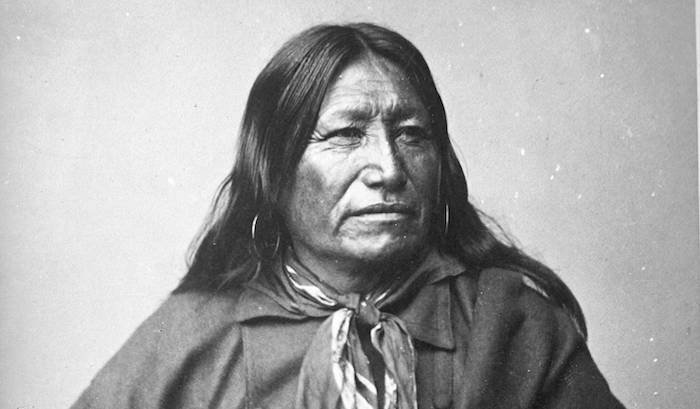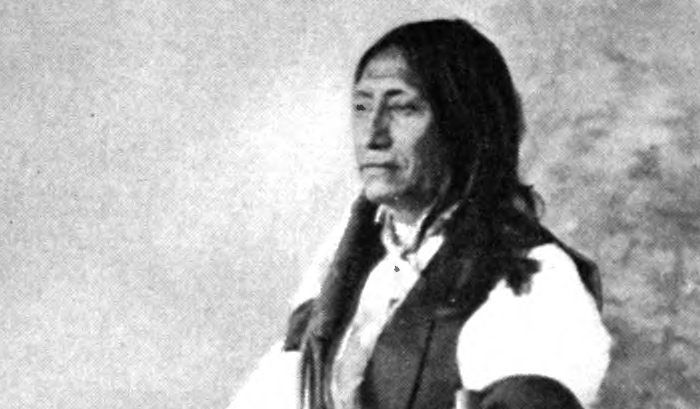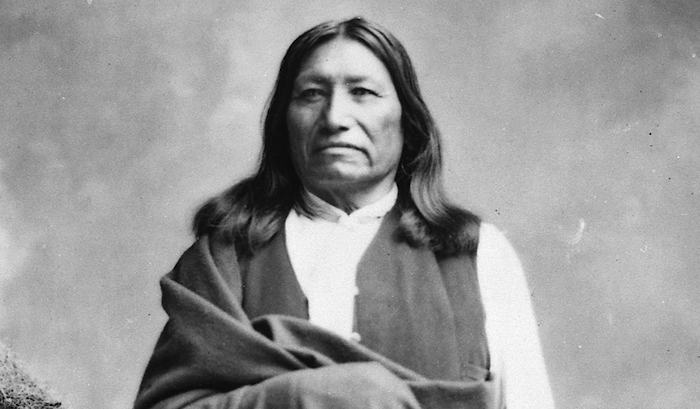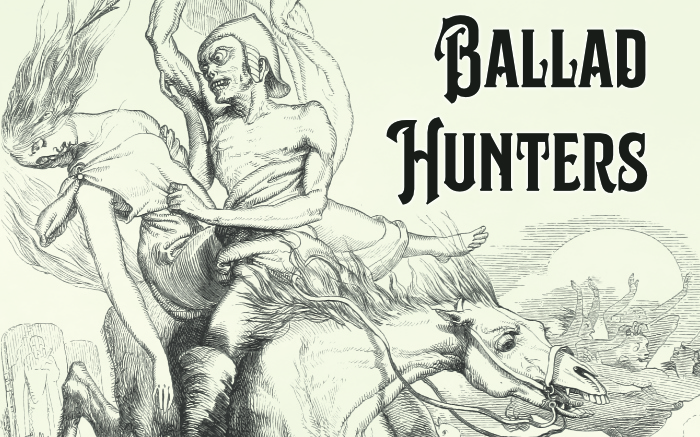The Lakota Sioux leader Spotted Tail was a remarkable – and controversial – figure in the 19th-century Great Plains. Among his many accomplishments, Spotted Tail got his band into the freight business, getting paid to haul wagons across the plains. The man himself makes a compelling NPC, and his efforts to get some of his people work as teamsters can be turned into a fictional RPG adventure in the campaign you’re already running.
This post is brought to you by beloved Patreon backer Colin Wixted. Thanks for helping keep the lights on! If you want to help keep this blog going alongside Colin, head over to the Patreon page – and thank you!

Spotted Tail (Sinte Gleska in Lakota) was born in 1823 or 1824 into a Sicangu (or Brulé) Lakota Sioux band near where today South Dakota, Nebraska, and Wyoming meet. His was not an aristocratic lineage; many Sicangus would argue that his later leadership was inappropriate. He proved himself early in wars against the Pawnees. He started earning battle honors at age sixteen. Six feet tall, strong, and skilled, Spotted Tail was a terrifying presence in war. More than that, he was smart. He had a head for both tactics and politics. People liked following him. This kid was going places.
In 1854, a dispute between the Minniconjou Lakotas and the U.S. federal government over a lame cow escalated into a conflict involving many Lakota bands. As part of the diplomatic process to resolve the war, Spotted Tail volunteered to serve as a hostage. He was imprisoned from 1855 to 1856 in Fort Leavenworth, Kansas. The trip down and the time in the Army facility gave him a new perspective. He rode in a steamship down the Missouri River. He saw the booming city of St. Louis. He saw Americans “as numerous as worms in the ground,” their industry, and their war machine. And that perspective made him understand that the Lakotas would lose every war they ever fought against the United States.
When Spotted Tail was released, he returned to his band and clawed his way up the ranks, eventually coming to lead it, despite his low birth. And above all else, when Spotted Tail made policy, he didn’t antagonize the United States.
Spotted Tail was not the only Lakota leader to attempt such a policy. But no one else pulled it off so successfully. Young men behave in similar ways the world over, and when a Lakota leader stood up to say, “I think we shouldn’t fight the United States government because we will lose,” the usual response was to call him a pussy and go fight. Anybody who’s ever been sixteen remembers knowing this person or being him. But Spotted Tail could get these young men to stand down because of his reputation.
You have to understand, the man was terrifying. He’d killed so many Pawnees everyone had lost count. He wasn’t afraid to bully and threaten his political rivals, even the most capable Lakota fighters. You couldn’t call him a pussy. When he said the war wasn’t winnable, you believed him. And if you announced your intention to try anyway and he threatened to kill you, you sure believed that. So even as Sitting Bull, Crazy Horse (his step-son-in-law), Red Cloud, and others carried out wars against the U.S. Army, Spotted Tail’s band refrained. Indeed, as the warlike chiefs’ bands shrank due to attrition, starvation, and desertion, Spotted Tail’s band sometimes grew, swelled by those same deserters.
I feel like I’m giving Spotted Tail a weirdly violent description here. And I want to be clear: he was more than a bully. He was genuinely adept at politics, at getting people to like him, at marrying into the right families and making the right friendships, at accruing and calling in favors, being charming, and even at using the government’s bureaucracy against itself. But the reason he was in a position to play politics at this level despite his low birth was because of his prior battlefield accomplishments, his continued accomplishments in ongoing wars with the Pawnees, and the fact that he really was the scariest motherfucker in the room, always.

As Spotted Tail aged, it became increasingly clear that his band was going to be confined to a reservation. He did a good job delaying the change and getting the best land he could for his people. But the only way to stop the change would be war, and war was off the table. Spotted Tail thought the best way to prolong his people’s existence (he genuinely doubted that the Lakotas would still exist in the 21st century; obviously, they very much do) was to acculturate: learn English to speak with white Americans (while still speaking Lakota at home), take up farming, and learn settled trades.
Spotted Tail was particularly interested in wagon-driving. It was a skilled profession. Not only did you have to know how to drive draft animals, you had to be able to repair wagons when they broke, often using tools Lakotas didn’t know. Wagon-driving was important, because it could reduce a major financial expenditure for Spotted Tail’s band. Under the treaty the federal government chose to recognize, the band was owed an annual delivery of food, supplies, and equipment worth a certain dollar amount. These supplies were delivered by American teamsters who charged outrageous rates – and whose pay came out of the dollar value of the supplies delivered. If some of Spotted Tail’s people could become teamsters and get those contracts, the band would get more supplies (since rates would be lower), some members would get steady employment, and the money paid would stay in the band.
Spotted Tail started advocating for this change in 1870, but it wasn’t until 1878 that the government granted permission. It was not an easy transition. When the former contractors learned of the government’s decision, they burned the prairie from the Missouri River to the Rosebud Reservation so there’d be no food for the draft ponies. The wives of the new Lakota teamsters mocked them for taking up a profession with no traditional prestige. Ranchers selling cattle to the teamsters stole ponies that had to be recovered without provoking a war.
But the new profession worked! Spotted Tail oversaw the allocation of wagons and harnesses, checking every nut and bolt personally. In 1882, when the landing on the Missouri River closed, eight hundred Sicangu Lakotas switched to hauling freight from the nearest rail terminus, and kept doing it for decades. Freighting fed families on terms that wouldn’t provoke war, and caused less cultural disruption than a switch to farming or manufacturing.
Despite these accomplishments, Spotted Tail remained deeply controversial. For one, his efforts started to become self-interested, materially benefitting himself and his relatives: a deep violation of trust in a traditionally communitarian leadership structure. For another, his historically accommodationist policies actually became insufficiently accommodationist for a new generation of Sicangu leaders. And his violent leadership style led to a violent end.
In 1881, Spotted Tail rode down a political rival named Crow Dog, who concluded Spotted Tail was going to kill him, so he shot Spotted Tail dead first. The U.S. government considered Spotted Tail an ally and arrested Crow Dog for murder. Crow Dog appealed all the way to the U.S. Supreme Court, which ruled in Ex Parte Crow Dog that the Lakota nation retained its sovereignty, so the United States had no authority to try a Lakota for the murder of another Lakota on Lakota land. Congress would soon pass laws undermining much of of the power of Ex Parte Crow Dog, but the heart of the ruling – that Native nations remain sovereign – is still an important precedent today.

At your table, Spotted Tail makes great inspiration for a memorable NPC: a charming, capable politician who’s able to move in much higher circles than others of his station because of martial prowess and interpersonal intimidation.
If you fictionalize it, you can make a cool adventure out of Spotted Tail’s efforts to get his people into freight work, and insert that adventure into your ongoing campaign. A controversial but powerful leader is trying to get some of his people contracts as teamsters. He’s got any number of good reasons for it, but he’s getting pushback in every direction. The current teamsters don’t want to lose their exorbitant existing contracts. The spouses and friends of the new teamsters mock them for wanting to try something new. There are all kinds of technical and educational obstacles to turning people into teamsters. And the old teamsters are resorting to violence. They burn the grassland to make it harder to haul freight. Maybe they team up with the leader’s rivals or try to kill him. Maybe the former teamsters even know other teamsters who transport monsters for menageries and gladiator shows and are convincing their buddies to release monsters on the freight routes.
The premise – folks trying to become teamsters – is a little mundane, but I think the adventure will be richer for being relatable.
Sing and fight magical folk ballads in 1813 England and Scotland! This free early-access edition has everything you need to play a Ballad Hunters one-shot about the traditional song Barbara Allen.
The game has:
– Investigative adventures centered around the lyrics of traditional British ballads
– Simple, story-driven rules inspired by the GUMSHOE engine
– A historical setting that is grim but hopeful
– Magic where characters make ballad verses come to life
Ballad Hunters is the sequel to Shanty Hunters, winner of a 2022 Ennie Award (Judge’s Choice) and nominee at the Indie Groundbreaker Awards for Most Innovative and Game of the Year.
You can download the free early-access version of the game from DriveThruRPG or Google Drive.
Source
Spotted Tail: Warrior and Statesman by Richmond L. Clow (2019).
I’d been curious about Spotted Tail since reading about him in Dee Brown’s seminal Bury My Heart at Wounded Knee, where Brown characterized him as a diplomat. That’s certainly a fair characterization, especially for his role on the international (Lakota-U.S.) stage, which is Brown’s focus. (This post didn’t dig into that because it was about other stuff.) So imagine my surprise when I stroll into Wall Drug, a famous South Dakota tourist trap full of every kind of tchotchke, walk into the bookstore to see the most prominent book is titled some variation on America First, and then in one corner is a friggin’ Spotted Tail biography! The whole bookstore was like that: jingoistic garbage beside absolute gems, with nothing merely mediocre in between. It’s enough to make me wonder if that bookstore is stocked by two different people who don’t talk to one another.







